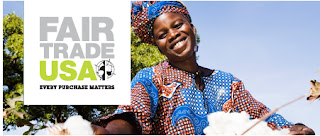| PRESS RELEASE / PR NEWSWIRE |
A Label to Ensure Fairness
Fair Trade USA, the leading third-party certifier of Fair Trade products in the United States, has announced that a full range of Fair Trade Certified™ clothing items are now available in the United States as part of a two-year pilot test, says a PR Newswire press release.
With the popularity of sustainable fashion, many brands in the market have launched new collections and started calling themselves fair. But how fair are they? Now, Fair Trade USA has taken the initiative to ensure fairness, right from the cotton fields to people’s wardrobe.
"Maybe you've already had a green makeover, but ethical fashion is about more than just protecting the environment. It's about people, and 'fair' is just a knock-off without third-party certification to deliver the proof," said Heather Franzese, Senior Manager of Apparel and Linens. "With the Fair Trade Certified™ label, consumers can now be confident that cotton farmers and factory workers earn more and have safe working conditions, the environment was protected, and the people who made the high-quality product can look forward to brighter futures."
Fair Trade USA is currently working with brands like Greenlight Apparel, prAna and Indigenous Designs to launch Fair Trade Certified clothing items, sourced from India, Liberia and Peru, in Spring 2011 and beyond.
The certification would help consumers and companies create jobs and sustainable livelihoods for garment workers and cotton farmers who are struggling with poverty in India, Latin America and Africa.
According to Fair Trade USA, Fair Trade principles include:
Fair price: Democratically organized farmer groups receive a guaranteed minimum floor price and an additional premium for certified organic products. Farmer organizations are also eligible for pre-harvest credit.
Fair labor conditions: Workers on Fair Trade farms enjoy freedom of association, safe working conditions, and living wages. Forced child labor is strictly prohibited.
Direct trade: With Fair Trade, importers purchase from Fair Trade producer groups as directly as possible, eliminating unnecessary middlemen and empowering farmers to develop the business capacity necessary to compete in the global marketplace.
Democratic and transparent organizations: Fair Trade farmers and farm workers decide democratically how to invest Fair Trade revenues.
Community development: Fair Trade farmers and farm workers invest Fair Trade premiums in social and business development projects like scholarship programs, quality improvement trainings, and organic certification.
Environmental sustainability: Harmful agrochemicals and GMOs are strictly prohibited in favor of environmentally sustainable farming methods that protect farmers’ health and preserve valuable ecosystems for future
To read the full story: Fair Trade USA Launches First Ethical Fashion Certification Label


No comments:
Post a Comment